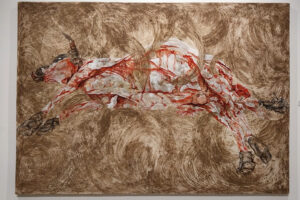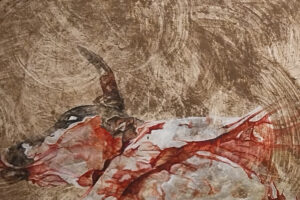

Ukusinda
by Yolo Mantiyane
Ukusinda, is an exhibition which explores the gender roles within Nguni communities between men and women. The intention of this body of work is to highlight the importance of the work that women do that often takes place subtly in the background, but is the foundation of the work that is required for the function of daily living and ceremonial events that take place. Ukusinda, refers to the cultural practice of smearing cow dung to create flooring. I place this labour, which is predominantly performed by women, as a thematic undercurrent but also a primary feature that is prominent within all the paintings. Ukusinda is a Nguni word that can also be defined as “to survive” and as “heavy”. This body of work celebrates how women’s work has historically and contemporaneously lent itself to the notion of survival despite the heavy burdens accompanying these duties. The use of dung in my paintings mimics the technique used in the traditional flooring practice, in the circular repetition of movement by the hand as the fingers drag the dung on this surface throughout.
The painted subjects of the animals, which were slaughtered by men, emerge through the layers. This treats the slaughtering of the animals as the focal point of the work as figurative subject, but integrates it with the abstracted tracery of ukusinda as each task informs one another. The paintings thus become a conversation of the two tasks: slaughtering, performed mostly by men, and ukusinda, performed by women. These two roles, while separate, speak to the gendered tasks expected within the Nguni community. It sets the scene through landscapes of slaughtered pigs on a washing line during umcimbi (ceremony) with the garden in the background. A carved image of ubuhlanti (kraal), a space occupied by men where slaughtering would occur and women would not be permitted to enter, and a space where dung would be found for ukusinda to be done. These works are not only a discussion about gender roles and performance, but an additional layered exploration of who occupies which space based on their gender. I have placed the stool in front of the door of our family rondavel, where I saw the women who have come before me besinda (past tense of ukusinda). It is with this stool (on which my now late grandfather sat on) that I reference the site in which I learnt the definition of ukusinda.










